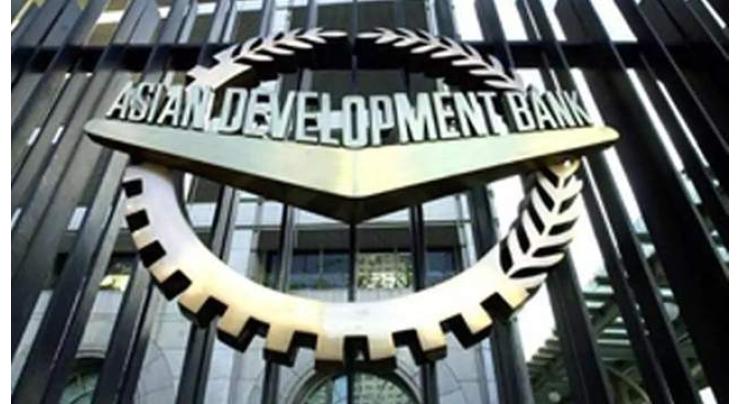
Sustained Reforms, Disaster Resilience Key To Continued Economic Growth, Says ADB
Muhammad Irfan Published September 30, 2025 | 07:10 PM

Pakistan’s improved macroeconomic conditions contributed to an uptick in growth in fiscal year 2025 (ended 30 June 2025), underpinned by increased investment driven by continued policy reforms and economic stability, the Asian Development Bank (ADB) said in a report released on Tuesday
ISLAMABAD, (UrduPoint / Pakistan Point News - 30th Sep, 2025) Pakistan’s improved macroeconomic conditions contributed to an uptick in growth in fiscal year 2025 (ended 30 June 2025), underpinned by increased investment driven by continued policy reforms and economic stability, the Asian Development Bank (ADB) said in a report released on Tuesday.
According to the Asian Development Outlook (ADO) September 2025, ADB’s annual flagship economic publication, Pakistan’s growth is projected to continue in the medium term, with real gross domestic product (GDP) growth forecast at 3.0% in FY2026 as macroeconomic stability deepens through sustained reforms addressing structural vulnerabilities.
Economic reform has progressed considerably under the IMF Extended Fund Facility arrangement that began in October 2024. Policy consistency and climate resilience remain vital to maintaining the growth momentum. Downside risks to the outlook remain high.
“Pakistan’s growth prospects remain positive,” said ADB Country Director for Pakistan Emma Fan. “However, the country continues to face structural challenges, compounded by recurring disasters such as the recent floods.
In this context, consistent reforms and policy implementation are essential for reinforcing policy credibility, sustaining economic momentum, and enhancing the country’s resilience, Fan added”
In FY2026, economic activity is expected to strengthen, supported by improved external buffers and renewed business confidence following the US-Pakistan trade agreement. However, the damage caused to infrastructure and farmland by the recent floods may weigh on growth.
Recovery and rehabilitation efforts, bolstered by fiscal incentives for the construction sector announced in the FY2026 budget, are expected to partially offset the adverse impact.
Average inflation is projected to increase to 6.0% in FY2026, reflecting the impact of flood-related supply chain disruptions on food prices and the increase in gas tariffs.
In response, the central bank is expected to adopt a cautious approach to easing monetary policy to stabilize inflation within its medium-term target range of 5%–7%.
Recent Stories

Etihad Rail to complete solar-powered Ghuwaifat freight terminal by end of 2025

ADAFSA confirms ban on cryptocurrency mining on farms, promoting responsible agr ..

UAE Chess Federation to field five players at People of Determination Chess Olym ..

Masood, Mohammad Khan star as Grace Academy crushes KGS by 268 runs

Emirates’ safety rules for customer usage of power banks onboard, now in full ..

‘The Emirates: The Startup Capital of the World’ national campaign: Ajman's ..

Ducab Group acquires Oman’s National Cable Factory to accelerate Sultanate’s ..

Chadian President honours UAE CEO with Officer of National Order

Dubai Press Club announces graduation of second cohort of Arab Podcast Programme ..

Etihad Airways returns to Zanzibar with summer flights

Women leaders share tech stories at Women in Technology Forum

Dubai PodFest 2025 brings together leading Arab podcasters to explore sector’s ..
More Stories From Business
-
Euro gas acquisition cleared by CCP
49 minutes ago -
PESCO, PEDO sign agreement for sale of Koto HPP produced electricity
1 hour ago -
FTO appoints honorary advisers
2 hours ago -

Rupee gains 04 paisa against US Dollar
1 minute ago -

The Pakistan Stock Exchange (PSX) stays bullish, gains 1,646 more points
9 minutes ago -

Economy shows stability with moderated inflation, rising manufacturing
9 minutes ago
-
WCCIS annual meeting highlights women’s economic empowerment
3 hours ago -
Pharmaceutical goods' export increases by 4.27% to US$64.990 mln
3 hours ago -
NPO to organize webinar on ‘Fire Safety & Fire Fighting’ on Oct. 9
4 hours ago -
PQ Activity
5 hours ago -

Sustained reforms, disaster resilience key to continued economic growth, says ADB
9 minutes ago -

Foreign Exchange (Forex) Open Market Rate in Pakistan 30 August 2025
5 minutes ago










